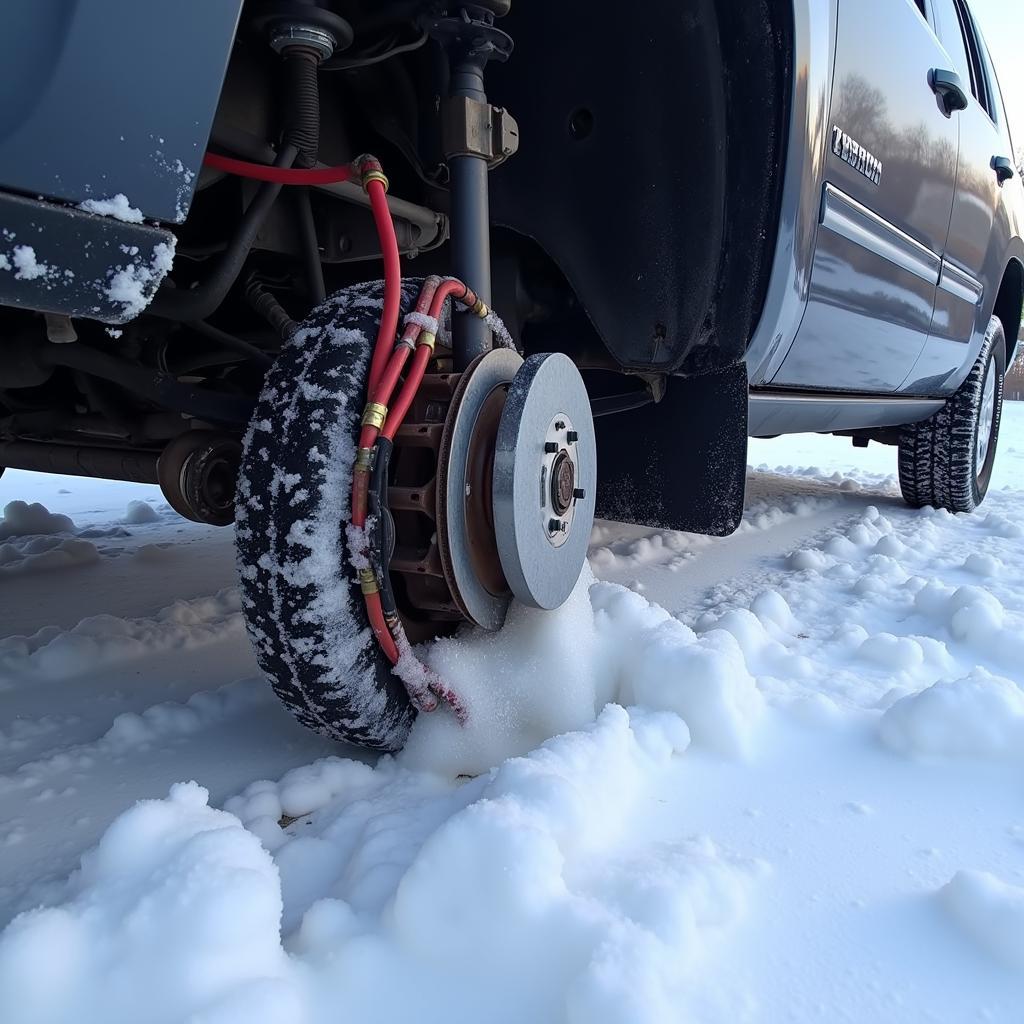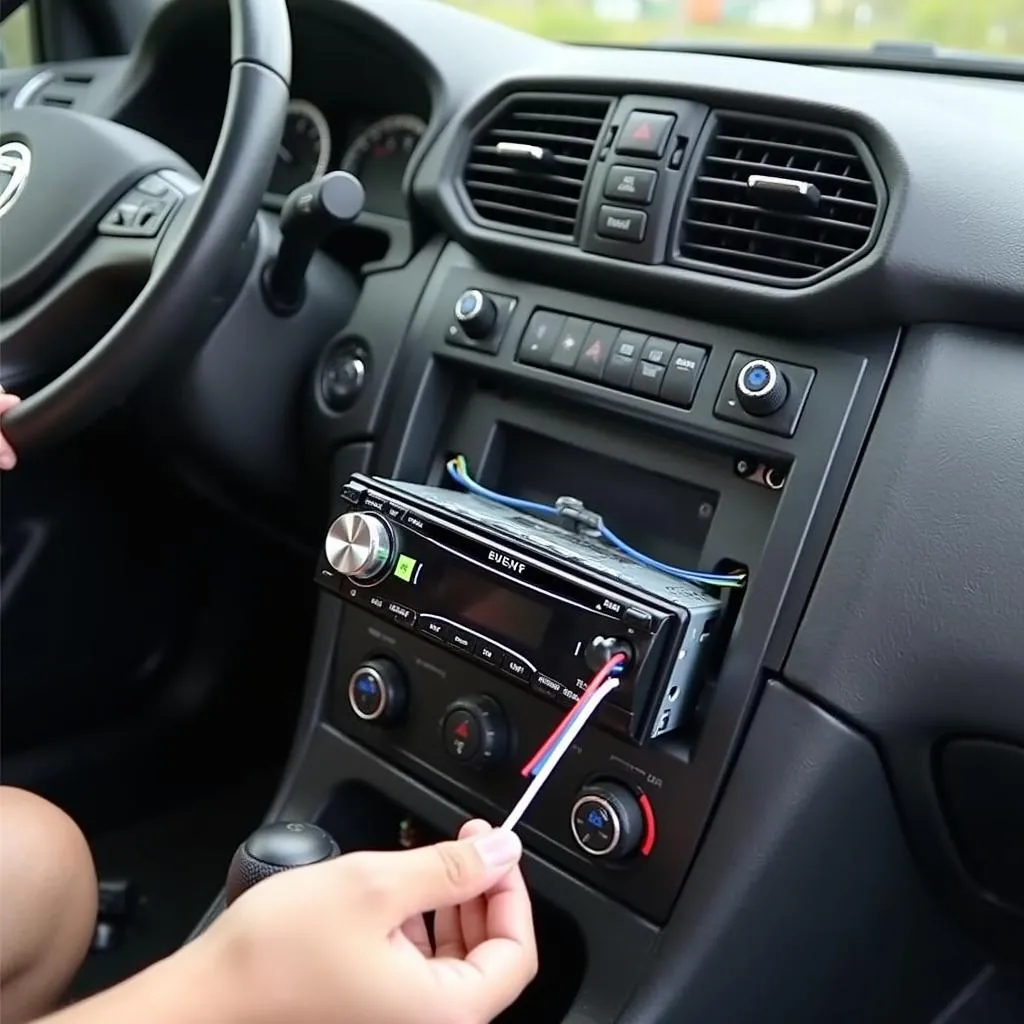If you’re driving your 05 GMC Yukon in icy conditions and the brake system warning light pops on, it’s understandable to feel a surge of panic. Don’t worry, this is a common issue, especially in challenging winter weather. This article will guide you through the potential causes and solutions, empowering you to address the problem safely and effectively.
Understanding Your GMC Yukon’s Brake System Warning Light
Your Yukon’s brake system warning light is designed to alert you to a range of potential issues, from low brake fluid to more serious problems like a malfunctioning ABS system. In icy conditions, the warning light could be triggered for several reasons:
- Low Brake Fluid: Cold weather can cause brake fluid to contract, potentially triggering the warning light. It’s crucial to check your brake fluid level and top it up if necessary.
- Worn Brake Pads: Thin brake pads can be exacerbated by icy conditions, reducing their effectiveness and potentially triggering the warning light.
- ABS Sensor Issues: Snow and ice can accumulate on the ABS sensors, interfering with their ability to function correctly and leading to false warning light activations.
- Brake Line Problems: While less common, extreme cold can sometimes cause brake lines to freeze or even crack, leading to a loss of brake fluid pressure and triggering the warning light.
Troubleshooting the Brake System Warning Light in Icy Conditions
Here’s a step-by-step guide to help you diagnose and potentially fix the brake system warning light on your 05 GMC Yukon in icy conditions:
- Check Your Brake Fluid Level: This should always be your first step. Locate the brake fluid reservoir under the hood (consult your owner’s manual if you’re unsure). If the fluid level is low, add the appropriate DOT 3 or DOT 4 brake fluid (as recommended in your owner’s manual).
- Inspect Your Brake Pads: If your brake pads are worn thin, they may be contributing to the warning light, especially in icy conditions. Consider having a mechanic check your brake pad thickness if you’re unsure.
- Clear Snow and Ice from ABS Sensors: Carefully remove any snow or ice buildup from the ABS sensors located near the wheels. Use a soft brush or cloth to avoid damaging the sensors.
- Check for Frozen Brake Lines: If you suspect frozen brake lines (this is more common in extreme cold), it’s crucial to contact a qualified mechanic immediately. Do not attempt to thaw the lines yourself, as this can be dangerous.
 Frozen Brake Lines on a GMC Yukon
Frozen Brake Lines on a GMC Yukon
When to Seek Professional Help
While some issues can be resolved with simple checks and maintenance, it’s important to know when to call in the professionals. If you experience any of the following, contact a qualified mechanic immediately:
- The brake warning light remains on after checking and topping up brake fluid.
- You hear unusual noises when braking, such as grinding or squealing.
- Your brake pedal feels spongy or soft.
- Your vehicle pulls to one side when braking.
- You suspect frozen brake lines or other serious mechanical issues.
 Mechanic Inspecting GMC Yukon Brake System
Mechanic Inspecting GMC Yukon Brake System
Expert Insight
John Miller, ASE Certified Master Technician, emphasizes, “Never ignore a brake system warning light, especially in icy conditions. It’s always better to err on the side of caution and have your vehicle inspected by a professional to ensure your safety and the safety of others on the road.”
Staying Safe on Icy Roads
Driving in icy conditions requires extra vigilance. Here are a few additional tips for staying safe:
- Reduce your speed and increase your following distance.
- Brake gently and avoid sudden stops.
- Be aware of black ice, which can be difficult to see.
- Keep your headlights on for better visibility.
Conclusion
A glowing brake system warning light on your 05 GMC Yukon in icy conditions can be unsettling, but understanding the potential causes and taking appropriate action can help you stay safe. Remember to check your brake fluid, inspect your brake pads, and clear any snow or ice from the ABS sensors. If the problem persists or you suspect a more serious issue, don’t hesitate to contact a qualified mechanic.

